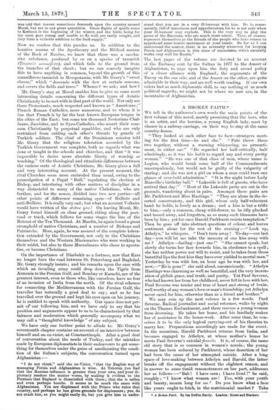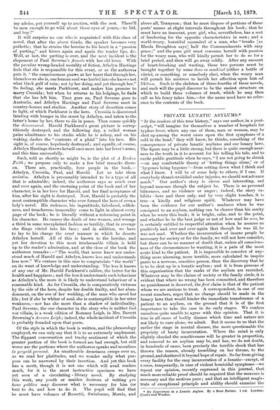A BROKEN FAITH.*
WE tell in the authoress's own words the main points of the first volume of this novel, merely premising that the hero, who is an artist, and the heroine, a young English lady, meet by chance in a railway-carriage, on their way to stay at the same country-house.
"They looked at each other face to face—strangers meet- ing for the first time—he and she." "Fate threw these two together, without a warning whispering, no presenti- ment, in either ear." "He regarded her half-critically, half admiringly, as it was his habit to regard any and every pretty' woman." "He was one of that class of men, whose name is Legion, who would break some half of the Commandments unscrupulously, but would not be guilty of the vulgarity of staring ; and she was not a girl on whom a man. could turn one glance of over-bold admiration." "It is the night before Lady Manville's birthday ball." "Lakeside is full of guests, who have arrived that day." "Most of the Lakeside party are out in the grounds, wandering about in pairs. Amongst these pairs are Mr. Parkhurst and Miss Hastings." "They are alone in the de- serted conservatory, and this girl, whose only half-reluctant hand he holds, is lovely as a dream ; and a kiss is but a trifle to him,—only a common, cheap wild-flower, to be idly plucked and tossed away, and forgotten, as so many such blossoms have been by him ; yet for once Harold Parkhurst resists temptation.' Then he goes off into abstract questions of colour, and leaves sentiment alone for the rest of the evening :—" Look up, Athelyn," he whispers. "Don't turn away ! To-day—our last day—you will let me take the memory of one kiss away with me P Athelyn—darling—just one !" "She cannot speak, but slowly she turns her face towards him, in obedience to a spell'; she has neither power nor will to resist, and he takes from those beautiful lips the first kiss they have ever yielded to mortal man." Yesterday he was with her, an hour ago he was with her, and now,—" He is gone !" she said aloud, unconsciously. "Athelyn Hastings was charming as well as beautiful, and the very incarn- ation of girlish grace, and truth, and purity. Yet Paul Severne, who had known her from her childhood, never fell in love with her. Paul Severne was tender and true of heart and strong of brain. well worthy of any woman's love or man's friendship; yet Athelyn. never cared for him, otherwise than as a friend and brother."
We may sum up the next volume in a few words. Paul Severne, Radical journalist and social reformer, walks by night. on the Thames Embankment, and there rescues a young woman. from drowning. He takes her home, and his landlady makes her of assistance in the house-work. Alter some time, he con- ceives it to be the only logical carrying-out of his theories to marry her. Preparations accordingly are made for the event.. In the meantime, Harold Parkhurst returns from India, ann. becomes engaged to Athelyn, at whose mother's house he meets Paul Severne's suicidal fiancge. It is, of course, the same old story that is so common in women's novels ; the young woman has been seduced by Parkhurst, whose desertion of her had been the cause of her attempted suicide. After a long space of love-making between Athelyn and Harold, the latter breaks off the engagement without the slightest reason, awl in answer to some timid remonstrances on her part, addresses her as follows :—" Bali! I have seen ; I have lived !" he said, roughly ; "I know what women are ! You, with your youth and beauty, mourn long for me ? Do you know what a face like yours ought to fetch, in the matrimonial market ? Take • 4 Broker; Faith. By Ds* Darras Hardy. Loadon: Hurst and Blzokett.
my advice, put yourself up to auction, with the rest. There'll be men enough to go wild about those eyes of yours,—to bid, and buy !"
It will surprise no one who is acquainted with this class of novel, that after the above tirade, the speaker becomes very pathetic ; that he strains the heroine to his heart in a "passion of parting," and kisses again and again the tender lips, ,!te. Well, at last, the parting is over, and the next incident is the elopement of Paul Severne's fiancee with her old lover. With the peculiar wrong-headed morality of fiction, Athelyn Hastings feels that she is responsible for this event, or as the authoress puts it, "the consciousness gnaws at her heart that through her, blameless as she is, one human soul was hurled into she knows not what black gulf of ruin; not by her doing, and yet through her." So feeling, she meets Parkhurst, and makes him promise to marry Cressida; but when he returns to his lodgings, he finds that she has left him. Time goes on, Paul Severne goes to Australia, and Athelyn Hastings and Paul Severne meet in country-houses and studios. Another story of desertion comes to light, of which Parkhurst is the hero. Cressida is discovered fainting with hunger in the street by Athelyn, and taken to the latter's home by her, there to die in peace. Then comes quickly the denouement. Harold Parkhurst's great picture is surrep- titiously destroyed, and the following day, a veiled woman gains admittance to his studio while he is asleep, and on his waking, dashes the "contents of a phial" into his face. His sight is, of course, hopelessly destroyed; and equally, of course, Athelyn Hastings throws herself once more into her lover's arms, and this time successfully.
Such, told as shortly as might be, is the plot of A 'Broken Faith ; we purpose only to make a few brief remarks there- on. There are, practically, four people in the book,- Athelyn, Cressida, Paul, and Harold. Let us take them seriatim. Athelyn is presumably intended to be a type of all that is admirable; indeed, the authoress says as much over and over again, and the crowning point of the book and of her character, is in her love for Harold, and her final acceptance of him, after his sight is destroyed. Now, Harold is probably the most contemptible character who ever formed the hero of even a lady's novel. His rudeness, his ingratitude, falsehood, selfish- ness, and treacherous immorality come to light in almost every page of the book ; he is literally without a redeeming point in his character. He causes the death of two women, and wrongs a third in some unexplained fashion so terribly, that in revenge she flings vitriol into his face ; and in addition, we have to lay to his charge the cruel manner in which he deserts Athelyn herself. All of this is known to the heroine, and yet her devotion to this most irredeemable villain is held up to the reader's admiration, and at the close of the book the authoress remarks :—" The world, that never knew nor under- stood much of Harold and Athelyn, knows less and understands less now." We venture in this case to congratulate "the world" on its want of knowledge and understanding. The less it knows of any one of Mr. Harold Parkhurst's calibre, the better for its health and happiness ; and the less it understands such behaviour as Athelyn's, the more it is likely to understand behaviour of a reasonable kind. As for Cressida, she is comparatively virtuous by the side of the hero, despite her double frailty, and her aban- donment, on the eve of her wedding, of the man who saved her life ; but if she be whiter of soul, she is contemptible in her utter weakness,—nor has she more than a shadow of individuality. Paul Severne, the one character in the story who is neither fool nor villain, is a weak edition of Romney Leigh, in Mrs. Barrett Browning's Aurora Leigh; indeed, the whole incident of Cressida is probably founded upon that poem.
Of the style in which the book is written, and the phraseology employed, we can only say that it is to us extremely unpleasant. The flippant conversation and trashy sentiment of which the greater portion of the book is formed are bad enough, but still worse are the portions where the authoress speaks and moralises in proprid persona. An unutterable dreariness creeps over us, as we read her platitudes, and we wonder sadly what pur- pose can be answered by their insertion. And yet this book has a merit, though it is not one which will avail readers much, for it is the most instructive specimen we have yet seen of a circulating - library novel. By studying this work, any youth or maiden desirous of writing pro bono public° may discover what is necessary for him (or her) to do, and how to do it. The pupil will find that he must have volumes of Rossetti, Swiuburne, Morris, and above all, Tennyson ; that he must dispose of portions of these poets' names at slight intervals throughout his book; that he must have an innocent, pure girl, who, nevertheless, has a sort of hankering for the opposite characteristics in men; and a world-weary, beautiful scpundrel of a man, who "breaks [as Rhoda Broughton says] half the Commandments with easy grace ;" and the pure girl must consume herself with passion for the weary man, who will kindly permit her to do so for a brief period, and then will go away coldly. After any amount of heart-breaking and wasting, these two persons must be brought together by some dens or machind (either a bottle of vitriol, or something or somebody else), when the weary man will permit his mistress to lavish her affection upon hini ad libitum. Such is the skeleton of three-fourths of these novels, and such will the pupil discover to be the easiest structure on which to build three volumes of trash, which he may then call as his fancy takes him,—for the name need have no refer- ence to the contents of the book.



































 Previous page
Previous page